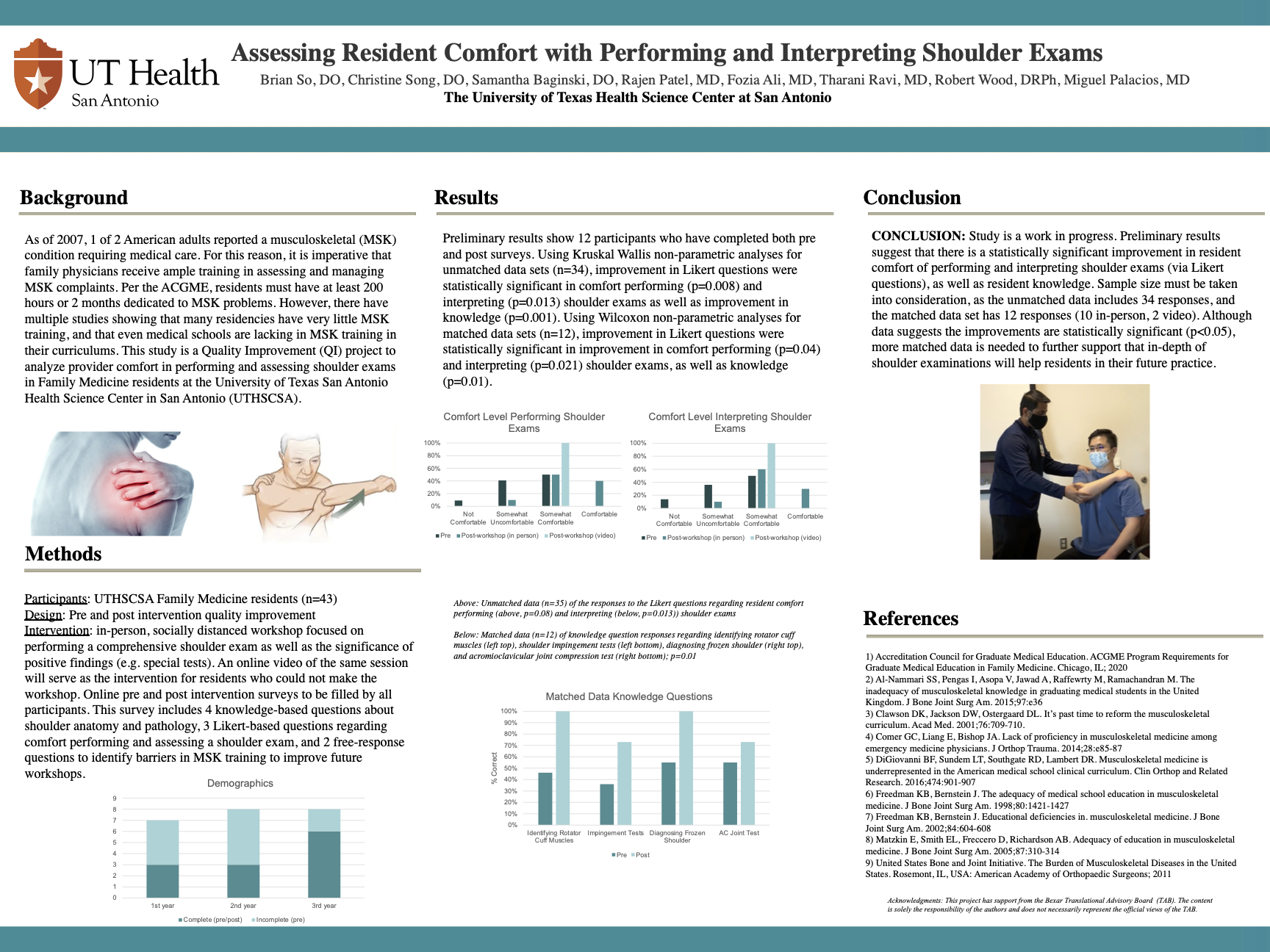PRP010: Assessing Resident Comfort with Performing and Interpreting Shoulder Exams
Brian So, DO, BS, MS; Samantha Baginski
Abstract
BACKGROUND: 1 of 2 American adults reported a musculoskeletal (MSK) condition requiring medical care, therefore it is imperative that family physicians receive ample training in assessing and managing MSK complaints. Per the ACGME, residents must have at least 200 hours or 2 months dedicated to MSK problems, however there are multiple studies showing that many residencies, and even medical schools, are lacking in MSK training. This study is a Quality Improvement (QI) project to assess provider comfort in performing and interpreting shoulder exams in Family Medicine residents at the University of Texas San Antonio Health Science Center in San Antonio (UTHSCSA).
OBJECTIVE: Assess the overall comfort of UTHSCSA Family Medicine residents in performing and interpreting a shoulder exam.
METHODS: Participants: UTHSCSA Family Medicine residents (n=43)
Design: Pre and post intervention quality improvement
Intervention: in-person, socially distanced workshop demonstrating a comprehensive shoulder exam. An online video of the same session will serve as the intervention for residents who could not make the workshop. Online pre and post intervention surveys to be filled by all participants. This survey includes 4 knowledge-based questions, 3 Likert-based questions, and 2 free-response questions.
FINDINGS: Preliminary results show 12 participants who have completed both pre and post surveys. Using Kruskal Wallis non-parametric analyses for unmatched data sets (n=34), improvement in Likert questions were statistically significant in comfort performing (p=0.008) and interpreting (p=0.013) shoulder exams as well as improvement in knowledge (p=0.001). Using Wilcoxon non-parametric analyses for matched data sets (n=12), improvement in Likert questions were statistically significant in improvement in comfort performing (p=0.04) and interpreting (p=0.021) shoulder exams, as well as knowledge (p=0.01).
CONCLUSION: Study is a work in progress. Preliminary results show a statistically significant improvement in resident comfort and knowledge. Sample size must be taken into consideration, as the unmatched data includes 34 responses, but the matched data set only has 12 responses (10 in-person, 2 video). Despite statistical significance (p<0.05), more data is needed to further support that in-depth of shoulder examinations will help residents in their future practice.
OBJECTIVE: Assess the overall comfort of UTHSCSA Family Medicine residents in performing and interpreting a shoulder exam.
METHODS: Participants: UTHSCSA Family Medicine residents (n=43)
Design: Pre and post intervention quality improvement
Intervention: in-person, socially distanced workshop demonstrating a comprehensive shoulder exam. An online video of the same session will serve as the intervention for residents who could not make the workshop. Online pre and post intervention surveys to be filled by all participants. This survey includes 4 knowledge-based questions, 3 Likert-based questions, and 2 free-response questions.
FINDINGS: Preliminary results show 12 participants who have completed both pre and post surveys. Using Kruskal Wallis non-parametric analyses for unmatched data sets (n=34), improvement in Likert questions were statistically significant in comfort performing (p=0.008) and interpreting (p=0.013) shoulder exams as well as improvement in knowledge (p=0.001). Using Wilcoxon non-parametric analyses for matched data sets (n=12), improvement in Likert questions were statistically significant in improvement in comfort performing (p=0.04) and interpreting (p=0.021) shoulder exams, as well as knowledge (p=0.01).
CONCLUSION: Study is a work in progress. Preliminary results show a statistically significant improvement in resident comfort and knowledge. Sample size must be taken into consideration, as the unmatched data includes 34 responses, but the matched data set only has 12 responses (10 in-person, 2 video). Despite statistical significance (p<0.05), more data is needed to further support that in-depth of shoulder examinations will help residents in their future practice.

Jack Westfall
jwestfall@aafp.org 11/21/2021Terrific project. Great poster and abstract. looking forward to the next steps and results. Thanks for sharing at NAPCRG